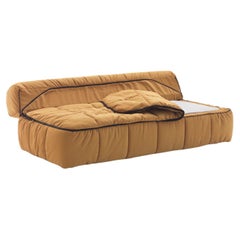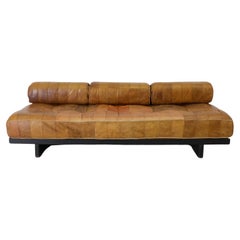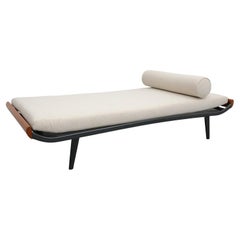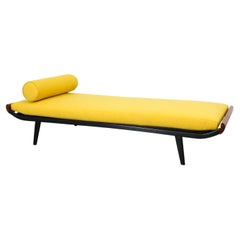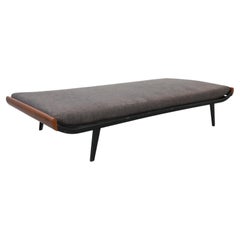Mid-Century Modern Daybeds
Organically shaped, clean-lined and elegantly simple are three terms that well describe vintage mid-century modern furniture. The style, which emerged primarily in the years following World War II, is characterized by pieces that were conceived and made in an energetic, optimistic spirit by creators who believed that good design was an essential part of good living.
ORIGINS OF MID-CENTURY MODERN FURNITURE DESIGN
- Emerged during the mid-20th century
- Informed by European modernism, Bauhaus, International style, Scandinavian modernism and Frank Lloyd Wright’s architecture
- A heyday of innovation in postwar America
- Experimentation with new ideas, new materials and new forms flourished in Scandinavia, Italy, the former Czechoslovakia and elsewhere in Europe
CHARACTERISTICS OF MID-CENTURY MODERN FURNITURE DESIGN
- Simplicity, organic forms, clean lines
- A blend of neutral and bold Pop art colors
- Use of natural and man-made materials — alluring woods such as teak, rosewood and oak; steel, fiberglass and molded plywood
- Light-filled spaces with colorful upholstery
- Glass walls and an emphasis on the outdoors
- Promotion of functionality
MID-CENTURY MODERN FURNITURE DESIGNERS TO KNOW
- Charles and Ray Eames
- Eero Saarinen
- Milo Baughman
- Florence Knoll
- Harry Bertoia
- Isamu Noguchi
- George Nelson
- Danish modernists Hans Wegner and Arne Jacobsen, whose emphasis on natural materials and craftsmanship influenced American designers and vice versa
ICONIC MID-CENTURY MODERN FURNITURE DESIGNS
- Eames lounge chair
- Nelson daybed
- Florence Knoll sofa
- Egg chair
- Womb chair
- Noguchi coffee table
- Barcelona chair
VINTAGE MID-CENTURY MODERN FURNITURE ON 1STDIBS
The mid-century modern era saw leagues of postwar American architects and designers animated by new ideas and new technology. The lean, functionalist International-style architecture of Le Corbusier and Bauhaus eminences Ludwig Mies van der Rohe and Walter Gropius had been promoted in the United States during the 1930s by Philip Johnson and others. New building techniques, such as “post-and-beam” construction, allowed the International-style schemes to be realized on a small scale in open-plan houses with long walls of glass.
Materials developed for wartime use became available for domestic goods and were incorporated into mid-century modern furniture designs. Charles and Ray Eames and Eero Saarinen, who had experimented extensively with molded plywood, eagerly embraced fiberglass for pieces such as the La Chaise and the Womb chair, respectively.
Architect, writer and designer George Nelson created with his team shades for the Bubble lamp using a new translucent polymer skin and, as design director at Herman Miller, recruited the Eameses, Alexander Girard and others for projects at the legendary Michigan furniture manufacturer.
Harry Bertoia and Isamu Noguchi devised chairs and tables built of wire mesh and wire struts. Materials were repurposed too: The Danish-born designer Jens Risom created a line of chairs using surplus parachute straps for webbed seats and backrests.
The Risom lounge chair was among the first pieces of furniture commissioned and produced by celebrated manufacturer Knoll, a chief influencer in the rise of modern design in the United States, thanks to the work of Florence Knoll, the pioneering architect and designer who made the firm a leader in its field. The seating that Knoll created for office spaces — as well as pieces designed by Florence initially for commercial clients — soon became desirable for the home.
As the demand for casual, uncluttered furnishings grew, more mid-century furniture designers caught the spirit.
Classically oriented creators such as Edward Wormley, house designer for Dunbar Inc., offered such pieces as the sinuous Listen to Me chaise; the British expatriate T.H. Robsjohn-Gibbings switched gears, creating items such as the tiered, biomorphic Mesa table. There were Young Turks such as Paul McCobb, who designed holistic groups of sleek, blond wood furniture, and Milo Baughman, who espoused a West Coast aesthetic in minimalist teak dining tables and lushly upholstered chairs and sofas with angular steel frames.
Generations turn over, and mid-century modern remains arguably the most popular style going. As the collection of vintage mid-century modern chairs, dressers, coffee tables and other furniture for the living room, dining room, bedroom and elsewhere on 1stDibs demonstrates, this period saw one of the most delightful and dramatic flowerings of creativity in design history.
21st Century and Contemporary Italian Mid-Century Modern Daybeds
Fabric
Mid-20th Century Swiss Mid-Century Modern Daybeds
Leather
Mid-20th Century Dutch Mid-Century Modern Daybeds
Metal
Mid-20th Century Dutch Mid-Century Modern Daybeds
Metal
Mid-20th Century Dutch Mid-Century Modern Daybeds
Metal
1960s Dutch Vintage Mid-Century Modern Daybeds
Fabric, Beech
Mid-20th Century French Mid-Century Modern Daybeds
Steel
Mid-20th Century Dutch Mid-Century Modern Daybeds
Metal
Mid-20th Century French Mid-Century Modern Daybeds
Upholstery, Elm
Mid-20th Century Dutch Mid-Century Modern Daybeds
Metal
1970s Swiss Vintage Mid-Century Modern Daybeds
Leather, Wood
1970s Italian Vintage Mid-Century Modern Daybeds
Metal, Steel
1960s Vintage Mid-Century Modern Daybeds
Teak, Cane
Mid-20th Century Danish Mid-Century Modern Daybeds
Metal
Mid-20th Century Dutch Mid-Century Modern Daybeds
Metal
1960s Dutch Vintage Mid-Century Modern Daybeds
Canvas, Pine
Mid-20th Century Dutch Mid-Century Modern Daybeds
Metal
21st Century and Contemporary Danish Mid-Century Modern Daybeds
Leather, Oak
1940s European Vintage Mid-Century Modern Daybeds
Cowhide, Wood
1960s American Vintage Mid-Century Modern Daybeds
Walnut, Cotton
1960s Slovenian Vintage Mid-Century Modern Daybeds
Birch, Plywood
2010s Italian Mid-Century Modern Daybeds
Fabric
1960s Austrian Vintage Mid-Century Modern Daybeds
Metal
1960s Dutch Vintage Mid-Century Modern Daybeds
Teak, Upholstery
Mid-20th Century American Mid-Century Modern Daybeds
Upholstery, Cane, Wood
20th Century Italian Mid-Century Modern Daybeds
Walnut, Fabric
Mid-20th Century Dutch Mid-Century Modern Daybeds
Metal
Late 20th Century American Mid-Century Modern Daybeds
Fabric, Wood
1960s Dutch Vintage Mid-Century Modern Daybeds
Metal
2010s American Mid-Century Modern Daybeds
Upholstery, Walnut
1960s French Vintage Mid-Century Modern Daybeds
Fabric, Wool, Bouclé, Upholstery, Oak, Velvet
1970s Italian Vintage Mid-Century Modern Daybeds
Alpaca
1960s Austrian Vintage Mid-Century Modern Daybeds
Metal
1940s Brazilian Vintage Mid-Century Modern Daybeds
Leather, Imbuia
2010s British Mid-Century Modern Daybeds
Bouclé, Oak
1970s Norwegian Vintage Mid-Century Modern Daybeds
Upholstery, Bentwood
1970s Swiss Vintage Mid-Century Modern Daybeds
Leather
1980s Norwegian Vintage Mid-Century Modern Daybeds
Leather, Birch
Mid-20th Century Dutch Mid-Century Modern Daybeds
Metal
1970s European Vintage Mid-Century Modern Daybeds
Chrome
1960s Italian Vintage Mid-Century Modern Daybeds
Metal
1960s Italian Vintage Mid-Century Modern Daybeds
Leather, Rosewood
1960s French Vintage Mid-Century Modern Daybeds
Fabric, Foam, Plywood
1960s French Vintage Mid-Century Modern Daybeds
Aluminum
2010s American Mid-Century Modern Daybeds
Stainless Steel
1970s Vintage Mid-Century Modern Daybeds
Wood, Fabric
1950s French Vintage Mid-Century Modern Daybeds
Metal
1970s Swedish Vintage Mid-Century Modern Daybeds
Chrome
1960s Danish Vintage Mid-Century Modern Daybeds
Upholstery, Oak
1960s Dutch Vintage Mid-Century Modern Daybeds
Metal
1950s Italian Vintage Mid-Century Modern Daybeds
Iron
Mid-20th Century Danish Mid-Century Modern Daybeds
Bouclé, Beech
Mid-20th Century Italian Mid-Century Modern Daybeds
Bamboo
1960s French Vintage Mid-Century Modern Daybeds
Elm
Mid-20th Century Indian Mid-Century Modern Daybeds
Upholstery, Cane, Teak
21st Century and Contemporary Portuguese Mid-Century Modern Daybeds
Brass
1960s French Vintage Mid-Century Modern Daybeds
Fiberglass
21st Century and Contemporary Portuguese Mid-Century Modern Daybeds
Stone, Onyx, Marble
